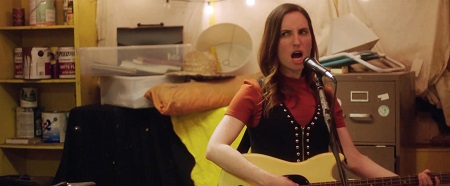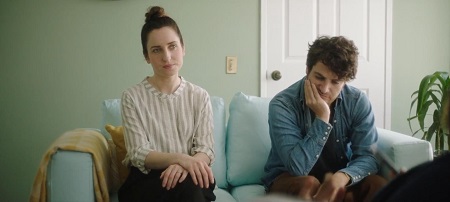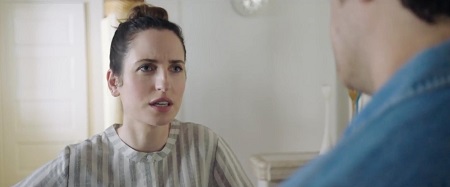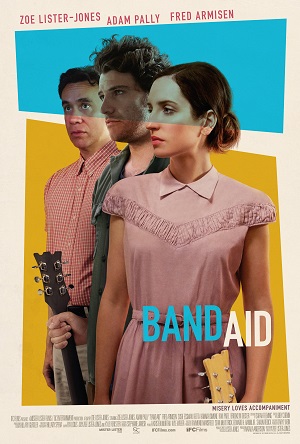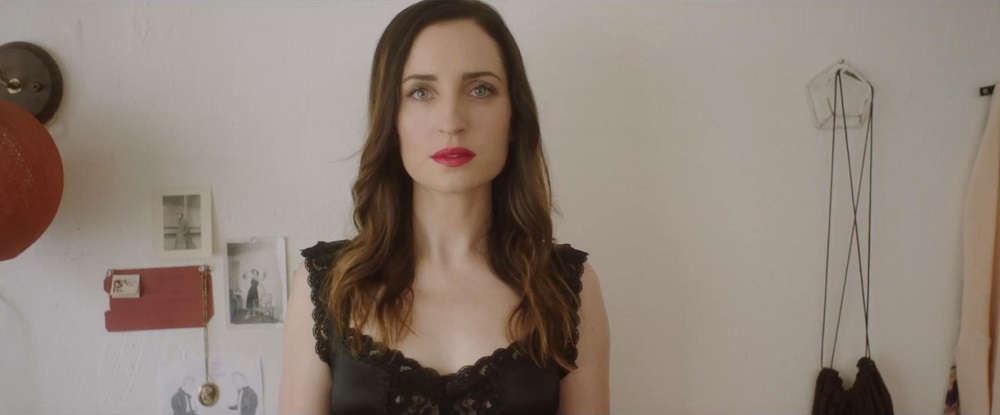
“Band Aid” – Interview with Zoe Lister-Jones
by Sara Michelle Fetters - June 28th, 2017 - Film Festivals Interviews
a SIFF 2017 interview
Feeling Moved
Zoe Lister-Jones Makes a Rockin’ Directorial Splash with Band Aid
It’s no secret I’m head over heels for Zoe Lister-Jones’ Band Aid. The actress and frequent screenwriter (Lola Versus, Consumed) makes her directorial debut with this winning, heartfelt marital saga, delivering one of 2017’s best films in the process. A music-filled story of a longtime married couple, Anna (Jones) and Ben (Adam Pally), who attempt to stay out of divorce court by forming a rock band and setting all their ferocious arguments to music, the movie is a smart, funny and emotionally affecting drama that held me spellbound start to finish. It’s like Lister-Jones is channeling her inner Richard Linklater or John Cassavetes, producing a decidedly subtle, lovingly introspective character study overflowing in pointed humanistic insights that are easy to relate to.
I met up with Lister-Jones while she was in town for the Seattle International Film Festival to chat about Band Aid and her filmmaking process. Here’s some of what she had to say:
Sara Michelle Fetters: Why this movie? Why was this script the one you wanted to utilize for your directorial debut?
Zoe Lister-Jones: I think it was just a moment in my life and career where it felt like I wanted to do something that scared me, and I had co-written, produced and acted in three features prior, so it also kind of just felt like the next logical step to add the hat of director. I was also kind of at a stage in my life as an artist where I was feeling like I wanted to find joy in the process again. From start to finish, even just from the time I decided to write the screenplay, it was kind of a challenge to myself to see if I could have fun doing it. I think directing was also a part of that challenge, to see if I could continue on the path of focusing less on product and less on the fear-based mentality that can often come with making your own work and to just try and have fun.
Sara Michelle Fetters: Did it help, that you had that experience, writing and acting in those prior films, that you were working so closely with the director? I would also imagine, going back to your 2004 one-woman show, that you pulled a little from that experience, too. Did all of that help ease any trepidation you might have had stepping behind the camera?
Zoe Lister-Jones: It feels like everything that I have done up until this point was leading me to get here. I learned so much from all of those experiences. I think, being a director, you really have to call upon skills that are required of a producer, that are required of a writer, that are required of an actor. I think actually being a multi-hyphenate is really helpful and did help me to feel a little less scared. I also think I learned a lot from those experiences about things that are kind of easy traps to fall into that I wanted to avoid.
Sara Michelle Fetters: Who are Anna and Ben to you, though? When you were putting this together and you were fleshing them out, how much of their back story did you come up with before you dropped them into this one segment of their lives?
Zoe Lister-Jones: I am super organized in all aspects of my life, but when I write I kind of like to let it free-flow. There’s something about outlining that really robs me of the joy of seeing what unfolds naturally out of one’s imagination. I didn’t have too much backstory for them when I started writing. I kind of knew the stage that they were both at in their lives, but a lot of the details of their characters and their arcs came as I was writing them.
Sara Michelle Fetters: Did anything about those details change when Adam came on?
Zoe Lister-Jones: The characters didn’t really change very much. It’s one of those things. I didn’t write the role for Adam. I didn’t write the role of Dave for Fred Armison. But, in retrospect, I don’t know who else could have played those parts. They both fit so perfectly into the world that I had created. I think part of what I set out to do as a director was I wanted the comedy to feel really authentic and really grounded. I think what drew me to Adam as an actor is that he is obvious so funny, but very grounded and can also access the deeper and darker parts of himself. We didn’t have very much rehearsal. We rehearsed as a band, but in terms of the scenes themselves we kind of read through the script, Adam and I, once or twice out loud and then it was just kind of on the day, letting it live within us. It’s one of those indescribable things that happen with certain actors when they work together, but there was such an ease between us.
Sara Michelle Fetters: I think that’s obvious because, for a movie that is so funny and is so moving and makes you just giggle in the weirdest places, I think what strikes me the most is the level of emotional authenticity and the rawness of what comes out of some of those scenes between you and Adam. There’s almost a Cassavetes quality to it all, which seems so weird juxtaposed against the sillier stuff. Not just to throw a name out there, but was that kind of what you were going for, mixing the rawness of those angry chamber room dramas with some of the obvious humor a premise like this can’t help but generate?
Zoe Lister-Jones: Totally! Totally. John Cassavetes was certainly an inspiration. I love movies that can’t be boxed into one category, and I love comedies that kind of can be a little more provocative and maybe enter into more dramatic and raw territory. While Cassavetes has certain little funny moments, they’re pretty bleak stories. I thought it would be cool to see what would happen if Cassavetes made a comedy. Not to say that I am anywhere near Cassavetes, but just as a sort of mindset to go into the creative process. I also looked a lot at one film in particular by Woody Allen, Husbands and Wives, which had a much more sort of vérité aesthetic, and the camerawork felt so voyeuristic in that film. I love this idea of feeling like certain scenes that you were accidentally in the room with this couple and that it verged on discomfort as a viewer. So yeah, I think those were definite influences and I was really lucky to have a scene partner who was willing to go there with me and wasn’t at all intimidated by navigating very different emotions throughout the film.
Sara Michelle Fetters: Right now the big conversation seem to be about women directing, especially in Hollywood, especially features. Twitter is blowing up because Sofia Coppola just won the best director prize at Cannes for The Beguiled. It’s the first time in almost 60 years. People are going crazy because there’s a women-only screening of Wonder Woman at the Alamo Drafthouse. Did you feel any added pressure as a director? Did any of these outside influences about women getting opportunities to step behind the camera and call the shots factor into what you were trying to do?
Zoe Lister-Jones: I didn’t feel pressure to perform because I’m a woman, but I’m very aware as a woman in this industry of a lot of double standards that continue to exist. I hired an all female crew on the film, I think in order to try and push back against some of those double standards you have to create opportunities for women in departments where they’re rarely given them. I also knew that, as a woman, there’s a part of me that liked the idea of surrounding myself with other women for this first directorial effort. I guess because of some of what I’ve witnessed in this industry it felt like…I don’t know. It felt like I would have a better chance of being supported and nurtured as an artist if I did.
Sara Michelle Fetters: Silly question, but what was more fun? Filming those performance scenes and going back to you rock and roll roots? Or creating an “Anger Room” and throwing yourself against a wall?
Zoe Lister-Jones: That’s a tough call. Throwing myself against the wall was really fun, but it also was kind of physically daunting. I was kind of afraid the whole time of throwing my neck out or something, so I would say probably the performance scenes. I was able to have a little more fun, mainly because we performed all of the music live. It was so fun because we were having little concerts for our crew every time we performed, so it was a blast. Obviously, Fred has been in bands in the past, but for Adam and I, it was a really amazing way to enter a new realm that I think was so cool and continues to be cool. We performed at Sundance as a band.
Sara Michelle Fetters: And you can’t all make it here to Seattle?
Zoe Lister-Jones: I know, right? I totally wish we could have. And we’re performing again next week in LA as a band, too!
We’ve got an EP that’s coming out and we also shot a music video. So the band lives on, which is such a cool added bonus to this movie.
Sara Michelle Fetters: You’ve had a number of produced screenplays before this. You’ve been an accomplished working actor for over a decade. You star in a hit television show in the form of “Life in Pieces”. Do you consider yourself a successful artist? Or are you still a work-in-progress?
Zoe Lister-Jones: I would consider myself a work-in-progress. Definitely. I mean, I think I’ve been very fortunate to be able to make a living from my art, which is so rare. That rarity is not lost on me. Both my parents are artists and were never able to make a living from their art, and I witnessed how much pain that brought them and how much sacrifice to the actual creative process ensued. But there’s so many things that I still want to do and opportunities I still want to either be given or to create for myself. I think part of the work that I have been making throughout my career and continue to make is to try and forge ahead and, yeah, keep the progress moving.
Sara Michelle Fetters: Does it ever surprise you, though, to see where you’re at right now, thinking where you came from? Do you ever look at it all and kind of just stand back in wonder? Or did you always know you’d be here?
Zoe Lister-Jones: I think in the last couple of months I’ve had some moments where I’ve been able, although I’ve been very busy, I’ve sort of caught myself and been able to reflect and really feel grateful for where I am now in my career. I think it’s hard when it’s a hustle and it’s a grind and it’s always getting that next thing off the ground or trying to book a TV show or a movie or whatever it is. It’s hard to take a moment and really reflect or take stock of where you are. I think I’ve been working so hard for so long that there’s never been a moment where I’m like, “Oh my God, look where I am!” It just feels like I’m continuing to try and push through to that next, whatever that next thing is.
I do think getting a third season of the TV show is, as an actor, it’s such a relief because to have a steady gig is such a rare thing. It allows me to then go and have the comfort of making my own work, which otherwise I think would just hold different stakes, just in terms of making a living. Then this movie, premiering at Sundance was like a dream. I’m living so many of my dreams right now. I feel so lucky.
Sara Michelle Fetters: What came first, the songs or the arguments that inspired them?
Zoe Lister-Jones: In my life, probably the arguments, which I drew upon. I think I wrote “I Don’t Want To F You” first, as a jumping off point, then most of the songs unfolded as the screenwriting process unfolded. It was pretty organic. They kind of came part and parcel with the characters’ arcs themselves.
Sara Michelle Fetters: Were you surprised at all that Adam could sing so well?
Zoe Lister-Jones: Totally. I didn’t even know that Adam could play guitar when I offered him the part, which is kind of embarrassing to admit. I knew that these characters, in the reality of the story, were picking up their instruments for the first time since high school so I just figured it’s okay if they don’t play well. Art imperfections were going to be a part of the storytelling, but I didn’t know how good he was going to be at guitar and I definitely had no idea that he could sing. It’s been so fun to watch him in that role because I think so few people have ever seen him do this. I learned to play bass for [the film] as well.
Sara Michelle Fetters: Where do you go from here? Do you have the directing bug?
Zoe Lister-Jones: Yes, totally. I think I would love to continue writing, directing and starring. I’ll take all of those things separately, but I think in combination it’s such an amazing artistic endeavor and something that I’ve found so nourishing on a personal level that, yeah, I’m planning to do my next film in my next hiatus, so next Spring.
Sara Michelle Fetters: So, Zoe Lister-Jones is the next Clint Eastwood?
Zoe Lister-Jones: Oh, God. Sure. But with VERY different politics. Very different.
Sara Michelle Fetters: What do you want audiences talking about after they watch Band Aid?
Zoe Lister-Jones: I guess I just hope that they feel moved, whatever that means to them. Whenever I leave a film that I love, this is kinda New-Agey, but my heart is full. That can be something that’s really funny or that can be something that’s sad, but I think that [the movie] has shifted you in some way, at least in the moments upon leaving. That’s what I hope happens.
– Interview reprinted courtesy of the SGN in Seattle
